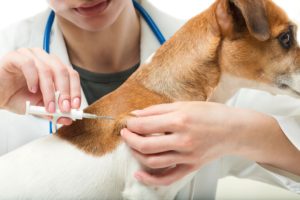How Can We Help?
Vaccines: The Greatest Advancement of Pet Health in our Lifetime
A fantastic vaccination success story is about one of the most deadly viruses in the world. More deadly than Ebola – Rabies Lyssavirus or simply Rabies which is a zoonotic disease that animals can spread to people.
Dog rabies didn’t arrive in the United States until sometime in the late 1700’s It was common in the USA prior to the 1960’s in dogs when the majority of cases were in domestic animals. In 1944, there were approximately 9,000 rabid dogs in the United States. Over the last 60 years, rabies in the United States has changed dramatically as more than 90% of all animal cases reported annually to CDC now occur in wildlife.
In fact, the United States has been free from the canine strain of rabies associated with direct dog-to-dog transmission since 2007 with the principal rabies hosts today being wild fox, raccoons, skunks and bats. The rabies vaccination programs in the USA have proven very successful.
What most Americans don’t know is that canine rabies remains stubbornly endemic in dogs throughout much of the world, including Latin America, sub-Saharan Africa, and parts of South and East Asia. In these regions, the disease is a significant human public health burden the majority of the annual 55,000 human deaths caused by the fatal brain infection can be attributed to the bite of an infected dog.
We should learn a lesson from our friends in South America about becoming lax in vaccination programs. Recently, several South American countries (Argentina, Brazil, Chile, Colombia, Ecuador, Paraguay, Peru, Uruguay), with highly successful programs for the control and elimination of dog-maintained rabies, have weakened or suspended canine vaccination programs. The result has been an increase in numbers of rabies-susceptible dogs and cats in their countries.
So, What is a vaccine and what does it do?
Let’s start at the beginning and learn about vaccines from the American Veterinary Medical Association (AVMA). Vaccines are products designed to trigger protective immune responses and prepare the immune system to fight future infections from disease-causing agents. Vaccines stimulate the immune system’s production of antibodies that identify and destroy disease-causing organisms that enter the body. They provide immunity against diseases and can lessen the severity or prevent diseases altogether.
OK, Why should I vaccinate my pet?

Here are 5 main reasons:
-
Vaccinations prevent many pet illnesses.
-
Vaccinations can help avoid costly treatments for diseases that can be prevented.
-
Vaccinations prevent diseases that can be passed between animals and also from animals to people.
-
Diseases prevalent in wildlife, such as rabies and distemper, can infect unvaccinated pets.
-
In many areas, local or state ordinances require certain vaccinations of household pets.
Are there risks to vaccinating my pet?
Any type of medical treatment has associated risks, but the risk should be weighed against the benefits of protecting your pet, your family and your community from potentially fatal diseases. The majority of pets respond well to vaccines and the most common adverse responses to vaccination are mild and short-term. Serious reactions are rare. Studies show that less than 1% of vaccinations result in adverse reactions, according to one report from the Journal of the American Veterinary Medical Association.
Which vaccinations should my pet receive?
“Core” vaccines are recommended for most pets in a particular area or geographical location because they protect from diseases most common in that area. “Non-core” vaccinations are for individual pets with unique needs. Your veterinarian will consider your pet’s risk of exposure to a variety of preventable diseases in order to customize a vaccination program for optimal protection throughout your pet’s life. Talk with your veterinarian about your pet’s lifestyle, including any expected travel to other geographical locations and/or contact with other animals, since these factors impact your pet’s risk of exposure to certain diseases.
Why do puppies and kittens require a series of vaccinations?
Very young animals are highly susceptible to infectious disease because their immune system is not yet fully mature. They receive protection through antibodies in their mother’s milk, but the protection is not long-lasting and there may be gaps in protection as the milk antibodies decrease and their immune system is still maturing. In many instances, the first dose of a vaccine serves to prime the animal’s immune system against the virus or bacteria while subsequent doses help further stimulate the immune system to produce the important antibodies needed to protect an animal from diseases.

What is serologic testing and is it useful to evaluate immunity to some diseases?
Theoretically, tests that measure antibody response (i.e., serologic titers) may help veterinarians determine the need for revaccination in some cases. Unfortunately, veterinarians cannot be certain that a specific concentration of antibody is always protective or that a lower concentration leaves an animal unprotected.
There is quite a bit of talk lately about the anti-vaxx movement and how it is also catching hold in the pet world. What’s going on here???
Veterinarians around the country say they are seeing increased cases of pet owners influenced by anti-vaccination rhetoric shun inoculation against dangerous diseases such as rabies because they fear it will cause autism in their furry offspring. “It’s a dangerous trend,” says Dr. John de Jong, president of the American Veterinary Medical Association, told The Post. De Jong said the autism spectrum disorder doesn’t occur in dogs and cats, but that hasn’t stopped pet owners from being influenced by the anti-vaccination misinformation, which has seen the nation’s largest human measles outbreak in 25 years. “I urge dog owners reading this article to have an open and candid conversation with their vet,” said de Jong, adding that the veterinary community vaccinated “judiciously.” I urge them to listen to the veterinarian’s best advice and think about the potential risks out there.” https://nypost.com/2019/05/22/anti-vaxx-movement-for-pets-is-a-death-sentence-vets-warn/
The anti-vaxx movement is more based on feelings and misunderstanding than science. There is absolutely no doubt that vaccines have made the lives of our pets much better than in the past. Horrible, life threatening diseases can be stopped in their tracks before they infect your furry friend or your family. Vaccinating your pet also protects other pets and wildlife as it induces herd immunity in the surrounding population of animals. Herd immunity arises when a high percentage of the population is protected through vaccination against a virus or bacteria, making it difficult for a disease to spread because there are so few susceptible animals left to infect.
Experts agree that widespread use of vaccinations within the last century has prevented death and disease in millions of animals. Vaccinations protect your pet from highly contagious and deadly diseases and improve your pet’s overall quality of life.
The stories and lessons learned about Parvo and Rabies can be repeated with several other communicable diseases we have in the USA that affect our loved pets. These deadly diseases remain in the world, just waiting for us to become negligent in our vaccination programs. This fact is somewhat analogous to the well-known Phrase, “Build it and they will come… Stop vaccinating and the diseases will come back with a vengeance!!
I want to acknowledge and thank these organizations as much of the information from this article came straight from their sources: American Veterinary Medical Association (AVMA) and the American Animal Hospital Association (AAHA)
https://www.avma.org/public/PetCare/Pages/vaccinations.aspx

